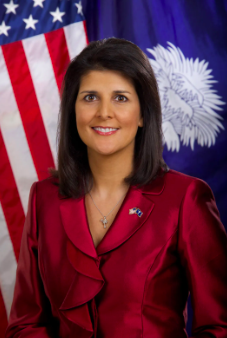Photo courtesy of Britannica
Everybody, it is said, roots for the underdog in a hard fight. Though when Nikki Haley, the former governor of South Carolina, announced that she would seek the GOP nomination in 2024, few were rushing out to buy Haley for President lawn signs. Haley, who spent time as a governor in South Carolina and in the Trump administration as ambassador to the United Nations, is a well-qualified but somehow a little-known contender. Only five percent of Republicans say that they would vote for Haley. Moreover, Haley does not have the key assaultive policy initiatives of probable opponents such as Ron DeSantis, the governor of Florida, and as such seems unlikely to garner the backing of the Republican Party’s more right-wing elements, who vote more often in primaries as a bloc. She is a wishy-washy-waffler on taxes, gay rights and January 6th. Her most defining act was her removal of the South Carolina battle flag from the state house following a hate crime shooting. That decisiveness seems long ago.
Although Haley’s campaign is a long-shot, her announcement nevertheless marks an inflection point in that it will likely prompt a wave of other Republican announcements. Former President Trump, who announced his intention to run again in mid-November, is still the leading Republican contender, with 37% of party members’ backing. Although Trump’s appeal amongst the Republican base remains firm, powerful donors and right-wing business types are lining up against him after Trumpian candidates performed poorly in last year’s midterm elections. For instance, the Koch brothers — billionaires who spend tens of millions of dollars backing right-wing and libertarian causes — have turned against Trump; Ken Griffin, a hedge-funder who put some 100 million dollars into last year’s cycle, has also come out against Trump. Perhaps most importantly, Rupert Murdoch, the billionaire media tycoon behind the Wall Street Journal and Fox News, has said that he will not back Trump’s third run.
The most promising candidate is Ron DeSantis, the governor of Florida, who unlike Trump performed wonderfully in the midterms. Under DeSantis – a veteran with flawless hair who attended Yale University – Florida’s economy has boomed. The once-closely-fought state backed him by almost 20 points in the midterms. DeSantis’ “anti-woke” message and crusades against progressives in the culture wars have found support amongst moderate Democrats as well as Republicans. DeSantis’ signature Florida bill is called the Stop WOKE act, and DeSantis has described the teaching of the 1619 Project (a special edition, archive and resource guide from The New York Times that is now a book asserting that America is fundamentally racist, with an academically contentious historical narrative) as state-sponsored woke indoctrination. DeSantis is an enthusiastic culture warrior, who, unlike Haley and Trump, seems to have both the firmness of conviction and the political capital to become the Grand Old Party’s nominee. He lags only marginally behind Trump in the polls, taking 35% of Republican support. With the full support of Florida’s legislature, DeSantis can expect to further burnish his gubernatorial winning streak by pushing through other priority anti-woke bills before the 2024 race kicks into high gear.
Trump and DeSantis will face off against other influential party men as they enter the primaries. Mike Pence, Trump’s vice-president, published a memoir, So Help Me God, last November. Standard ghostwritten memoirs of this type are often interpreted as a prelude to a presidential run. The porcine Mike Pompeo, CIA boss and secretary of state under Trump, has not only written a book, but apparently taken to the gym to cut a trimmer figure in advance of his likely run.
Other than Haley, few centrist candidates have indicated their intention to run for president. In this less radical wing of the Republican party, Larry Hogan, the former Maryland governor, seems to be a likely prospect: he is a traditional pro-business, classically liberal Republican who won his second election in a landslide victory and is the most approachable anti-Trump candidate.
The Republican party faces in 2024 what might be the most impactful decision in recent US political memory. Should the GOP continue to support Donald Trump, who despises progressive “wokus-pocus” but faces increasing headwinds on the national stage? Should they abandon Trump but back Pence, Pompeo, or DeSantis, signaling that they’re done with Trump’s antics but seek to continue in the furtherance of his political principles? The most sensible option would be to throw the might of the Republican electoral machine behind a centrist figure like Hogan or Haley, hoovering up a chunk of the Democratic electorate to make up for the hardliners whom they will anger. If cool heads prevail, Haley or Hogan might soon occupy the Oval Office. For now, though, Trump and his ilk seem likely to remain atop the GOP.






